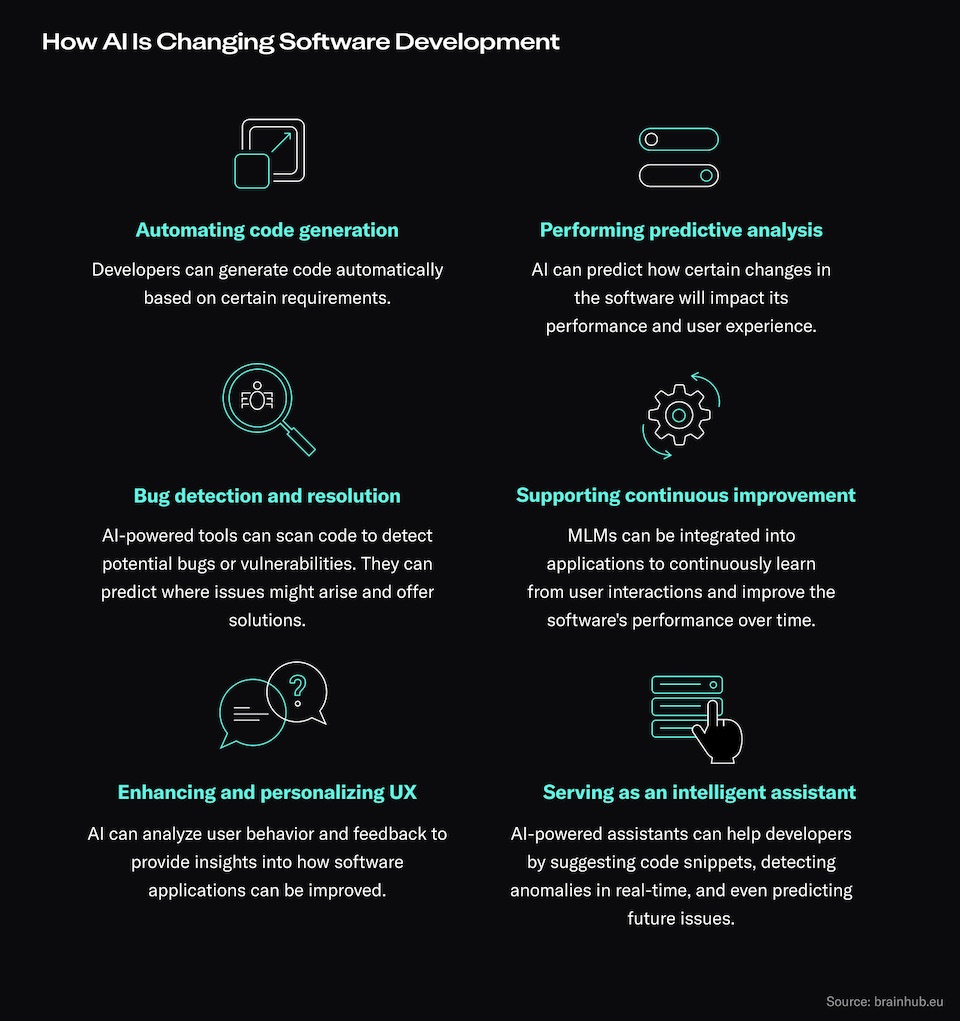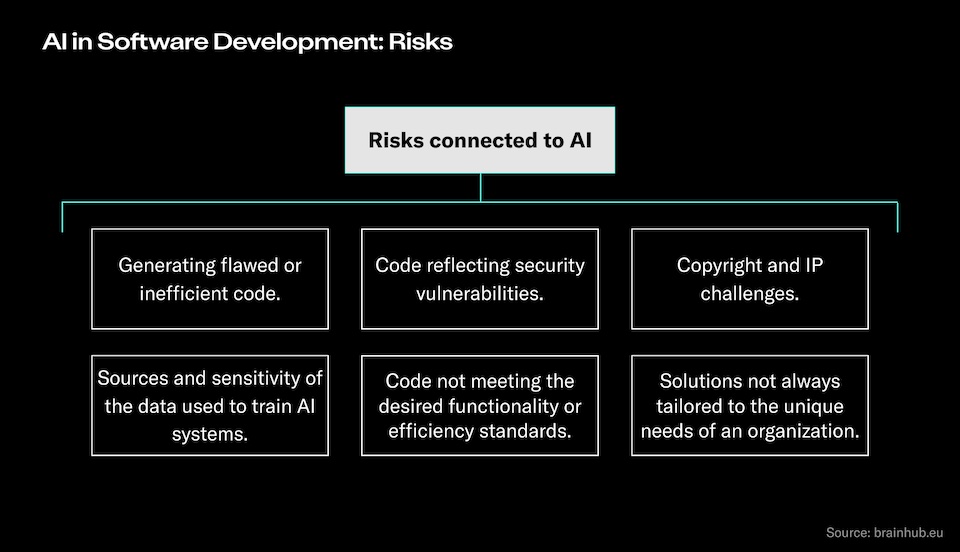

AI in Software Development
Subscribe to this collection and be first to get notified when new content arrives.


Subscribe to this collection and be first to get notified when new content arrives.

Seize the opportunities and recognize the risks of AI in software development. Learn how to navigate your software development project through these changes risk-free.
ARTICLES IN THIS COLLECTION
You can use AI to improve various aspects of software development:

With the help of AI, developers can now generate code automatically based on certain requirements. This not only speeds up the development process but also ensures that the generated code is error-free.
AI-powered tools can scan code to detect potential bugs or vulnerabilities. These tools can predict where issues might arise and offer solutions, making the debugging process more efficient.
AI can analyze user behavior and feedback to provide insights into how software applications can be improved, leading to a more user-centric design and functionality. AI can analyze user data to provide personalized experiences, such as content recommendations, user interface adjustments, and more.
AI can predict how certain changes in the software will impact its performance and user experience. This helps developers make informed decisions during the development phase.
Machine learning models, a subset of AI, can be integrated into software applications to continuously learn from user interactions and improve the software's performance over time.
Developers can now use natural language to communicate with development platforms, making it easier for those without deep coding knowledge to contribute to the development process.
AI can automate the testing process, ensuring that software applications are robust and free from critical bugs. This reduces the time and effort required for manual testing.
AI can help in optimizing algorithms, making software applications faster and more efficient.
AI-powered assistants can help developers by suggesting code snippets, detecting anomalies in real-time, and even predicting future issues.
AI can be used to predict project timelines, allocate resources efficiently, and even prioritize tasks based on urgency and importance.

While AI can assist in software development, there's a risk that it might generate flawed or inefficient code. Just like humans, AI can produce bad code, which might not always meet the desired functionality or efficiency standards.
AI-generated code can reflect the security vulnerabilities present in the training data. This means that if the AI was trained on code with security issues, it might inadvertently introduce similar vulnerabilities in the generated code. Additionally, there are concerns about the sources and sensitivity of the data used to train AI systems.
Using AI to generate code can lead to copyright and intellectual property challenges. For instance, if the AI model was trained on proprietary algorithms or copyrighted content, the generated code might inadvertently infringe on existing intellectual property rights.
Relying too heavily on AI for code generation, especially without proper validation, can lead to significant issues. If developers don't have the necessary technical knowledge to validate AI-generated code, they might end up integrating flawed code into their projects.
While AI tools can be powerful, they might not always be tailored to the unique needs of every organization. Many enterprises have legacy systems, and AI tools need to be adaptable to work seamlessly with these existing systems.
Incorporating AI into software development brings up ethical issues, especially concerning the quality of AI-generated code and its potential impact on the tech sector's future.

Generative AI is a part of artificial intelligence that specializes in creating or generating new data, content, or information. Unlike some AI that does specific tasks, generative AI is all about being creative. It uses techniques like neural networks and deep learning to produce text, images, music, and even videos that mimic or create entirely new content based on patterns and data it has learned from.
Generative AI changes a lot of industries and offers a chance to innovate. Let's take a look at how it can be used in healthcare.
Generative AI can tap into patients’ medical and family history, lifestyle, and other factors to summarize key data points and recommendations for follow-up.
This AI can be used to assist in diagnosing diseases like sepsis and enhance medical imaging data, leading to earlier disease diagnosis.
Generative AI can generate novel drug candidates based on specific criteria, potentially leading to safer and more effective drugs.
It can predict the efficacy and safety of new drug candidates by analyzing data on drug-target interactions. Generative AI can also identify patient subgroups more likely to respond to a drug, personalizing drug therapy.
Generative AI can increase workers’ productivity by acting as a conversational assistant.
It can be used to automate the extraction of medically relevant information from discussions, summarize interactions, and integrate notes into Electronic Health Record (EHR) systems.
Generative AI can also enhance communication through virtual agents (chatbots) and be used for the auto-generation of approval and denial letters, improving speed and effectiveness.
Generative AI can also streamline some operations in financial industry. For example:
Generative AI can be especially helpful in software development for banking:
Generative AI can detect anomalous and fraudulent transactions in the banking industry. For instance, Generative Adversarial Networks (GANs) can be trained to produce synthetic fraudulent transactions, which can then be compared to genuine data to enhance fraud detection capabilities.
Banks can use generative AI to track transactions in terms of location, device, and operating system. It can flag anomalies or behaviors that don't fit expected patterns, allowing bank personnel to review suspicious behavior.
AI can help banks determine a customer's eligibility for credit lending by risk scoring. Generative AI can also provide explanations for loan denials in a manner that's understandable to applicants.
Generative AI can be used to analyze consumer credit ratings and financial histories to determine a customer's creditworthiness. It can assess data from various sources to gauge the riskiness of a loan application.
There are also a few helpful implications of generative AI in educational industry. These can be for example:
AI can assist in generating teaching materials, such as quiz questions, explanations, and summaries.
It can also produce additional materials like reading lists, study guides, and flashcards.
Tools like NOLEJ can generate e-learning capsules in minutes, providing interactive videos, glossaries, and summaries.
AI can automate administrative tasks, freeing up teachers' time.
It can help in creating performance tasks, building rubrics, and scoring, allowing more targeted feedback.
AI can be used for predictive analytics, identifying trends in student performance and suggesting interventions.
Get smarter in engineering and leadership in less than 60 seconds.
Join 300+ founders and engineering leaders, and get a weekly newsletter that takes our CEO 5-6 hours to prepare.